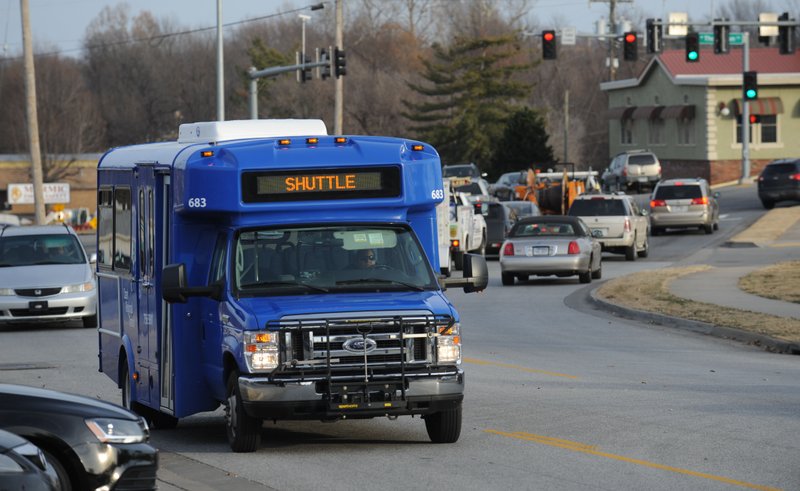SPRINGDALE -- Ozark Regional Transit will begin replacing its destroyed bus fleet by the end of the year, the service's director said Wednesday.
Director Joel Gardner told his board he expects to buy eight medium-sized buses by December for about $1 million, mostly from federal grants. The public transit provider lost 20 buses out of two dozen overall in a wind-whipped fire in early January and has relied on loaner vehicles from other companies around the country to keep running.
Ozark Regional Transit Fares
• Fixed-route fares range from free to $1.25 based on age and veteran status.
• Passes for multiple rides range from $3 for a day to $30 for an adult for a month of rides.
For more information, go to ozark.org.
Source: Ozark Regional Transit
The service hasn't fully recovered from the event but is making progress, according to data presented Wednesday. Daily ridership fell from about 1,200 passengers at the beginning of the year to about 850 but has since made up most of the gap.
"We're pushing forward every day," Gardner said.
ORT provides a dozen commuter and all-purpose routes and a pick-up service for people with disabilities throughout Benton and Washington counties. Federal, county and city money and fees cover most of its revenue, chief financial officer Mindy Campbell said.
The fleet's replacement will be slow going, Gardner told the board. He said the service's insurance will pay about $700,000 for a loss of more than $2 million, leaving ORT to make up the rest through grants or with its annual operating budget of $3 million.
Some details of the fire are still under investigation, but Gardner said routine "burn-offs" of diesel engine exhaust filters mixed with 40 mph wind could be the cause. The burn-offs had been done nightly for years with no emergencies, but the wind could have trapped and amplified the heat to a few thousand degrees.
Fayetteville sustainability and resilience director Peter Nierengarten, who stood in for board member Don Marr, said he worried federal grants might be less forthcoming with the drop in ridership.
"It just makes it that much harder," he said, recommending the service's projections and plans for expansion be a prominent part of grant requests.
ORT is studying the feasibility of running more routes along U.S. 71B and possibly Interstate 49 from Fayetteville to Bentonville. The Walton Family Foundation gave $140,000 toward the study.
The study was originally set to wrap up this month, but Gardner said Wednesday he wants to dig deeper into the routes' potential, getting corporate data from companies whose employees might use it, for example. The study should be finished by September.
The Walton foundation's 2015 Quality of Life Survey asked more than 1,000 residents what amenities they wanted in the region and found about one-third wanted more mass transit. Only a local professional sports team was a more popular choice.
ORT is letting veterans and children ride free during part of this summer. More than 1,000 veterans used the option in June, according to the service's data.
NW News on 07/27/2017
